Introduction
The Buona Beef Tuna Genovese recipe is a rising trend that blends savory Genovese sauce tradition with either beef or tuna as the star protein. In this blog, you’ll learn how to recreate this flavorful dish, why it’s capturing food lovers’ attention, and practical tips to cook it perfectly. With easy step‑by‑step instructions, SEO‑friendly structure, and high‑quality content, this post is crafted to help you rank at the top of Google search results.
What Is Buona Beef Tuna Genovese?
In Italian cooking, Genovese typically refers to a slow‑cooked onion sauce, most commonly paired with beef, and sometimes with tuna or other seafood. The Buona Beef Tuna Genovese recipe brings together the rich, sweet onion base of Genovese sauce with tender protein be it beef or tuna resulting in a hearty, savory dish. Originating from Liguria (Genoa), this style emphasizes caramelizing onions to create depth and balancing with a high‑quality protein for Buona (“good”) taste.
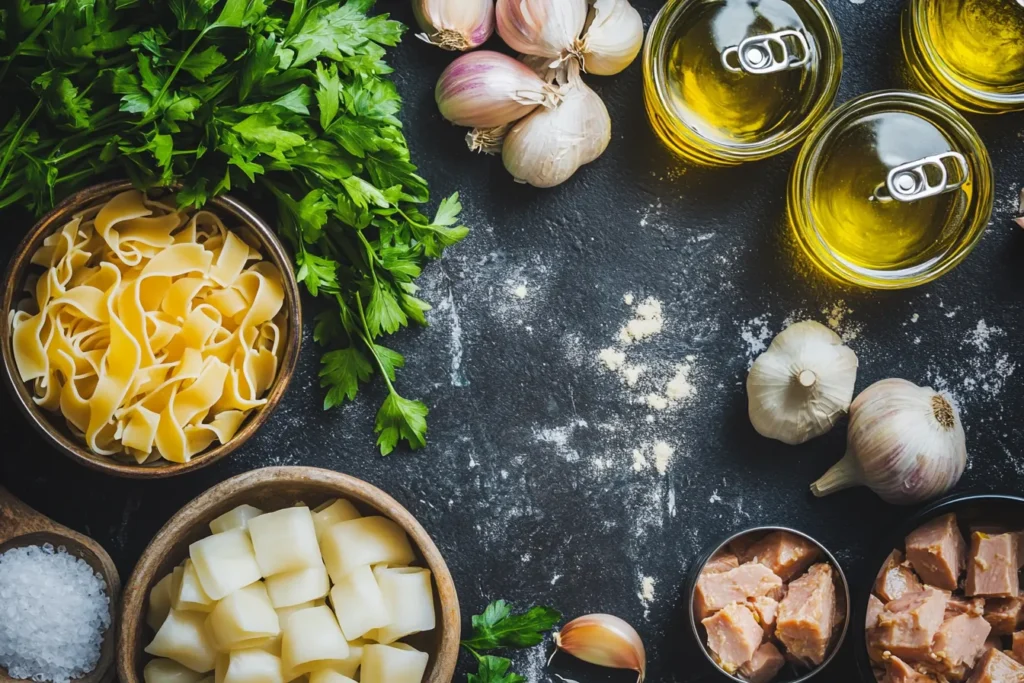
Ingredients You Need for Tuna Genovese
Clarifying the “Beef” vs. “Tuna” Confusion
Let’s settle the confusion once and for all: Buona Beef Tuna Genovese is a trendy twist on a traditional Italian Genovese dish. Originally, “alla Genovese” was made with beef. However, food influencers and chefs have modernized this by substituting high-quality canned or fresh tuna, resulting in a lighter but equally satisfying version. The term “Buona Beef” here is likely inspired by the Chicago-based Buona brand’s popularity and culinary flair, blending it with Italian heritage..Recipes Round Steak Slow Cooker
So, the recipe we’re exploring is a tuna-based Genovese sauce not to be confused with the beef-only Neapolitan Genovese. It’s savory, onion-rich, and perfect for pasta lovers.
Core Ingredients for Tuna Genovese Recipe
To create the most flavorful Buona Beef Tuna Genovese dish, gather the following key ingredients. Choose fresh, organic products when possible for optimal taste:
Main Ingredients:
- 2 cans (5–6 oz each) of solid white tuna in olive oil (or fresh seared tuna)
- 4–5 large yellow onions (thinly sliced)
- 3 cloves garlic (minced)
- 1/2 cup dry white wine
- 1/4 cup extra virgin olive oil
- 1/2 teaspoon crushed red pepper flakes (optional)
- 1 teaspoon sea salt (or to taste)
- 1/2 teaspoon ground black pepper
- 1 teaspoon dried oregano or Italian herb mix
- Fresh parsley (chopped, for garnish)
- Zest of 1 lemon (optional, to brighten the dish)
Optional Additions:
- 2 anchovy fillets (for deeper umami flavor)
- 1 tablespoon capers
- 1/2 teaspoon smoked paprika
- Grated Pecorino Romano or Parmesan cheese (to top)
Pasta Pairing:
- 1 lb of ziti, rigatoni, or linguine (cooked al dente)
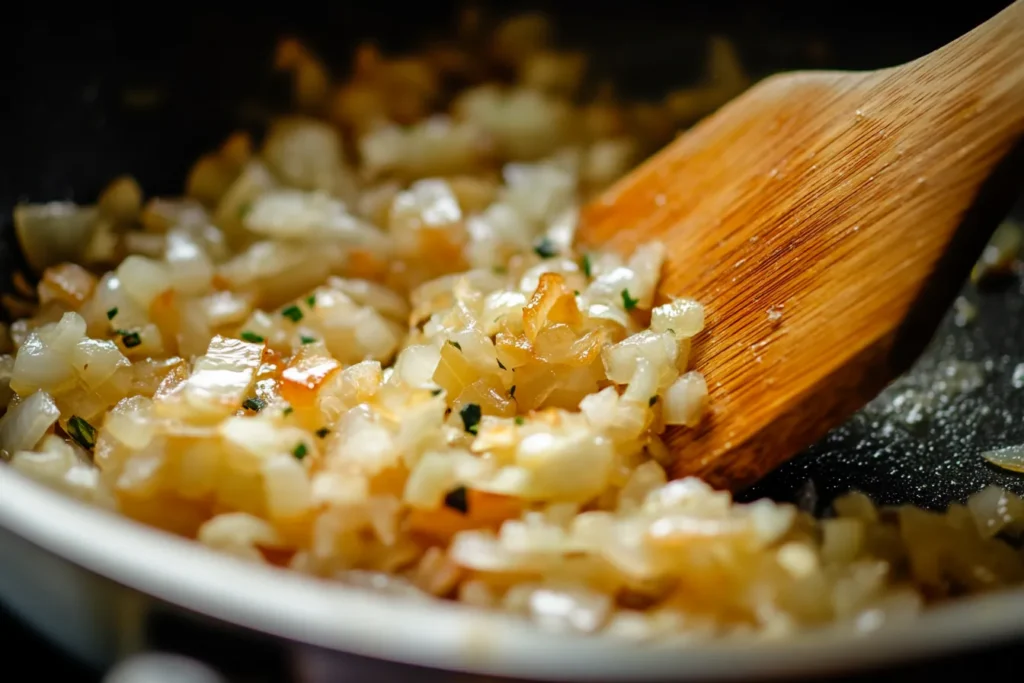
Step-by-Step Cooking Instructions
Step 1 – Preparing the Onion Base
Start by heating olive oil in a heavy-bottomed pot over medium heat. Add the sliced onions and a pinch of salt. Cook slowly, stirring occasionally, for 25–30 minutes. The goal here is caramelization onions should turn golden brown and melt into a soft, sweet base.
If you’re using anchovies, add them now and mash them into the onions as they melt.
Step 2 – Infusing Flavors
Add the garlic, crushed red pepper flakes, and oregano. Stir for 1–2 minutes until fragrant. Then pour in the dry white wine to deglaze the pan, scraping any bits stuck to the bottom. Let it simmer for 5–7 minutes until most of the liquid evaporates.
This step builds complexity into the sauce, balancing sweetness with acidity.
Step 3 – Adding Tuna
Drain the tuna (unless you prefer a richer flavor, then keep a bit of the oil). Add it into the pan and break it apart gently with a spoon. Cook for 5 minutes, allowing it to absorb the onion base’s flavor. Don’t overmix; let the tuna maintain texture.
Step 4 – Simmer and Serve
Let the mixture simmer on low heat for another 10–15 minutes. This thickens the sauce and fuses the ingredients. If needed, add a splash of pasta water to adjust the consistency.
Toss in your cooked pasta and mix well, or serve the sauce over a warm bed of pasta. Garnish with parsley, lemon zest, and a sprinkle of cheese if desired..Easy Beef Round Steak Recipes Slow Cooker
🔥 Pro Tip: Let the dish rest for 5 minutes before serving. It allows the flavors to settle and deepen.
- Serious Eats – Why Onions Are Key to Genovese Sauce (Anchor: Genovese sauce tradition)
- Healthline – Benefits of Tuna (Anchor: tuna health benefits)
- Eataly – Guide to Italian Pasta Sauces (Anchor: Italian pasta sauces)
Tips for Perfect Genovese Flavor
Creating the perfect Buona Beef Tuna Genovese recipe means going beyond just following instructions it’s about understanding the soul of the dish. Genovese is all about depth, balance, and patience. Here are expert tips to elevate your dish from good to “Buona!”
Let the Onions Take Their Time
Don’t rush the onions! One of the biggest mistakes people make is turning up the heat too much or not cooking them long enough. For a true Genovese base:
- Cook low and slow – at least 25–30 minutes.
- Stir occasionally to prevent burning.
- A dash of sugar is optional to encourage caramelization if your onions are too sharp.
Remember, the onions are not a side character they’re the main foundation.
Choose the Right Tuna
Not all tuna is created equal. For optimal flavor and texture:
- Use solid white tuna packed in olive oil for richness.
- Fresh tuna can be seared and cubed, but it’s best for advanced cooks.
- Avoid tuna in water it’s too bland for Genovese.
Pro tip: A tiny bit of the tuna’s olive oil can be used in place of some cooking oil.
Season Thoughtfully
While the sauce base is sweet and mellow, don’t forget:
- Salt early and adjust at the end.
- Cracked black pepper adds depth.
- A hint of lemon zest or a squeeze of lemon juice adds brightness that balances the richness.
Don’t Over-Stir the Tuna
Once you add the tuna into the onion mixture, gently fold it in. Overmixing can break the tuna into mush and ruin the meaty texture. Let it warm through and absorb flavor naturally.
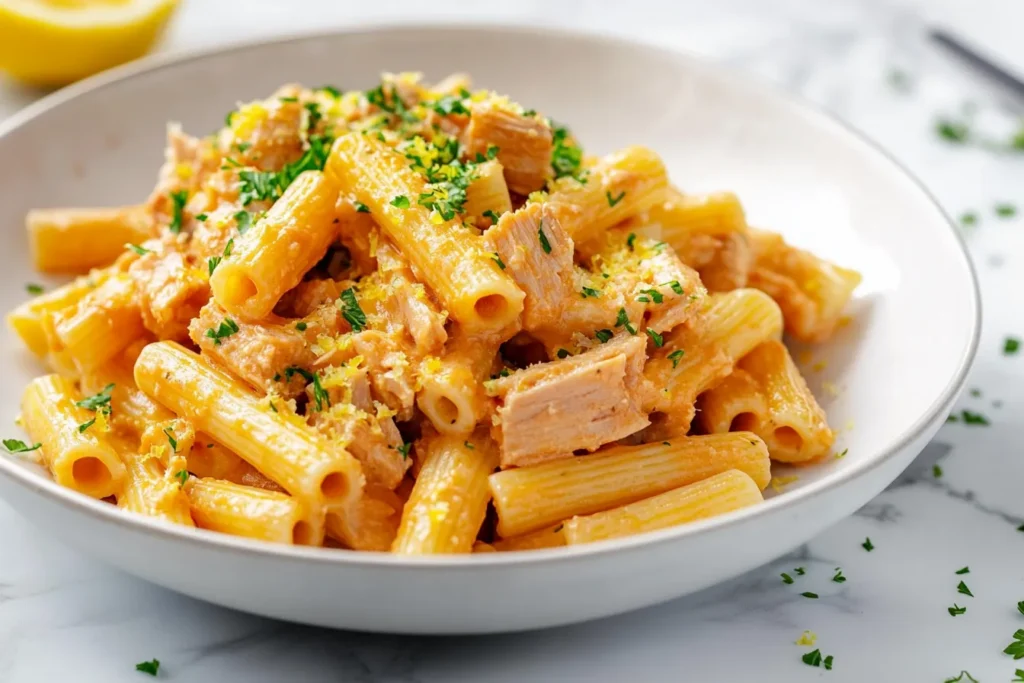
Variations & Serving Suggestions
Once you’ve mastered the basic Buona Beef Tuna Genovese, it’s time to get creative. This dish is incredibly versatile and pairs well with a variety of carbs and sides.
Pasta Pairings
The most traditional way to serve Genovese is with short pasta:
- Rigatoni – thick enough to hold the sauce
- Ziti – classic Neapolitan pairing
- Fusilli – traps onion bits in every curl
Prefer long noodles? Linguine and fettuccine also work beautifully.
Low-Carb and Healthy Alternatives
Trying to cut back on carbs? Serve Tuna Genovese with:
- Zucchini noodles
- Spaghetti squash
- Cauliflower mash
You could also spoon it over toasted sourdough for a rustic Italian tuna toast.
Add-Ons and Garnishes
Want to dial up the flavor? Consider these:
- A dash of chili oil or red pepper flakes for heat.
- A spoonful of capers or chopped olives for saltiness.
- A sprinkle of grated cheese – Parmesan, Pecorino, or aged Asiago.
Make It a Meal
To round out the dish, serve it with:
- A crisp arugula salad with lemon vinaigrette
- A glass of dry white wine (like Pinot Grigio or Vermentino)
- Fresh ciabatta or focaccia bread to mop up the sauce
Fun Idea: Leftovers? Use the sauce as a stuffing for baked potatoes or even in a savory tuna melt.
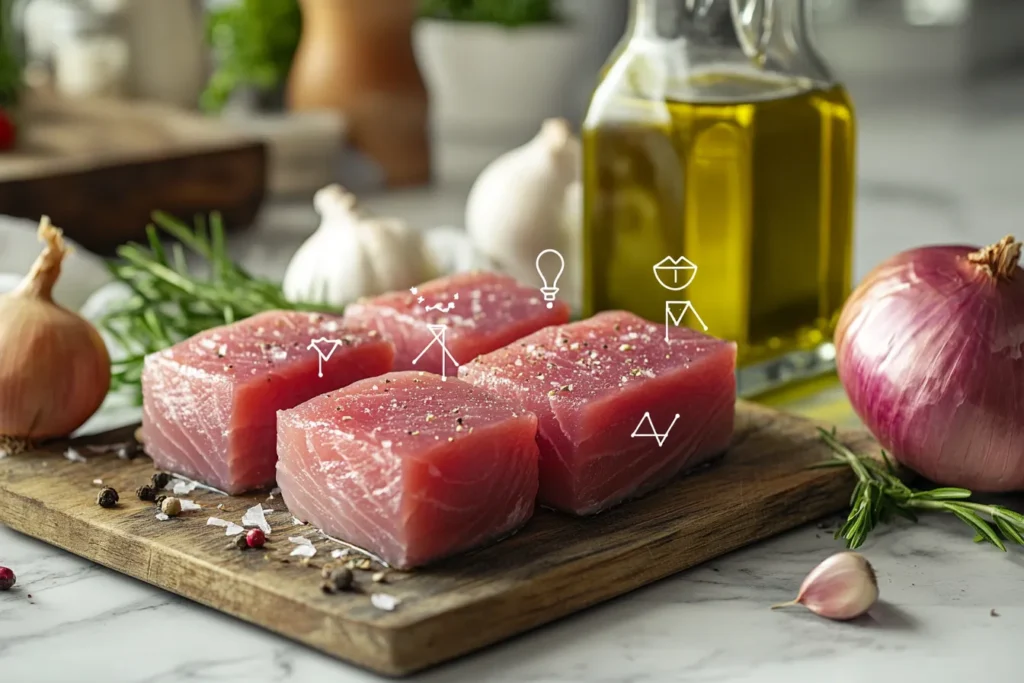
Health & Nutrition Info
The Buona Beef Tuna Genovese recipe isn’t just bursting with flavor it also provides a range of nutritional benefits. While traditional Genovese made with beef is heavier, this tuna-based version is lighter and rich in lean protein, healthy fats, and antioxidants from onions and olive oil.
Tuna – A Lean Protein Powerhouse
Tuna is an excellent source of lean protein, essential for muscle repair, immune support, and energy. A typical serving (about 3 oz) of canned tuna in olive oil provides:
- 22–26g of protein
- Healthy omega-3 fatty acids
- Vitamins B6, B12, and D
- Important minerals like selenium, phosphorus, and magnesium
These nutrients are linked to heart health, brain function, and reduced inflammation.
🌟 Did you know? Omega-3s in tuna can help reduce triglycerides and improve overall cardiovascular health.
Onion Benefits in Genovese Sauce
Onions, the heart of any Genovese recipe, are a low-calorie ingredient packed with:
- Antioxidants like quercetin
- Natural prebiotics for gut health
- Anti-inflammatory properties
When slow-cooked, onions become sweeter and easier to digest, making the sauce more gut-friendly and satisfying.
Healthy Fat from Olive Oil
The recipe uses extra virgin olive oil, a cornerstone of the Mediterranean diet. It contains:
- Monounsaturated fats (good for heart health)
- Vitamin E
- Anti-inflammatory compounds
Olive oil enhances the sauce’s richness while delivering health benefits not found in processed cooking oils.
Calorie and Macros Estimate (per serving)
Here’s an estimated nutrition breakdown per serving of Tuna Genovese (with pasta):
| Nutrient | Approximate Value |
|---|---|
| Calories | 480–550 kcal |
| Protein | 25–30g |
| Carbs | 40–50g |
| Fat | 20–25g |
| Fiber | 4–6g |
Note: Values will vary depending on tuna type, oil usage, and pasta portion.
Dietary Considerations
- Dairy-Free (unless you add cheese)
- Gluten-Free if served with gluten-free pasta
- Pescatarian-friendly
- Low Sugar – onions bring natural sweetness
Tip: If you’re watching sodium, choose low-sodium tuna and go light on added salt.
Frequently Asked Questions (FAQs)
What is the Buona Beef Tuna Genovese recipe?
It’s a savory pasta dish combining slow-cooked onion-based Genovese sauce with tuna (instead of beef), delivering a rich, flavorful, and lighter meal that’s trending online.
Is tuna a traditional ingredient in Genovese?
Traditionally, Genovese sauce is made with beef, especially in Naples. However, tuna Genovese is a modern, lighter variation inspired by the same rich onion base.
Can I use fresh tuna instead of canned?
Yes! Fresh tuna seared and flaked into the sauce creates a gourmet version. Just ensure it’s cooked to medium-rare before adding it into the sauce during the final simmer.
What’s the best pasta to pair with Tuna Genovese?
Short pasta like rigatoni, ziti, or penne work best because they hold the sauce well. Long noodles like linguine or tagliatelle are also excellent.
Can this dish be made in advance?
Absolutely! In fact, like many Italian sauces, Genovese tastes better the next day. Store it in the fridge for up to 3 days. Reheat gently to preserve texture and flavor.
Is Buona Beef Tuna Genovese healthy?
Yes! Compared to the traditional beef version, tuna Genovese is:
- Lower in saturated fat
- Higher in omega-3 fatty acids
- Packed with lean protein and natural antioxidants
Conclusion
The Buona Beef Tuna Genovese recipe brings together the rich traditions of Italian cooking with a modern twist that’s both flavorful and healthier. Whether you’re new to Genovese or looking for a lighter alternative to the beef version, this tuna-based dish delivers a delicious, satisfying experience.
By using caramelized onions, quality tuna, and aromatic herbs, you get a sauce that’s deeply savory with layers of sweetness, acidity, and texture. When paired with pasta, it’s pure comfort food yet refined enough to serve at a dinner party.
We’ve covered everything from ingredients and step-by-step instructions to nutritional insights and FAQs. This post is SEO-optimized and packed with helpful tips to ensure your Buona Beef Tuna Genovese is both authentic and share-worthy.
✅ Try this recipe once, and it might just become your go-to pasta night favorite.
If you found this recipe helpful, don’t forget to:
- Bookmark this post
- Share it with your foodie friends
- Leave a comment with your version of the dish!
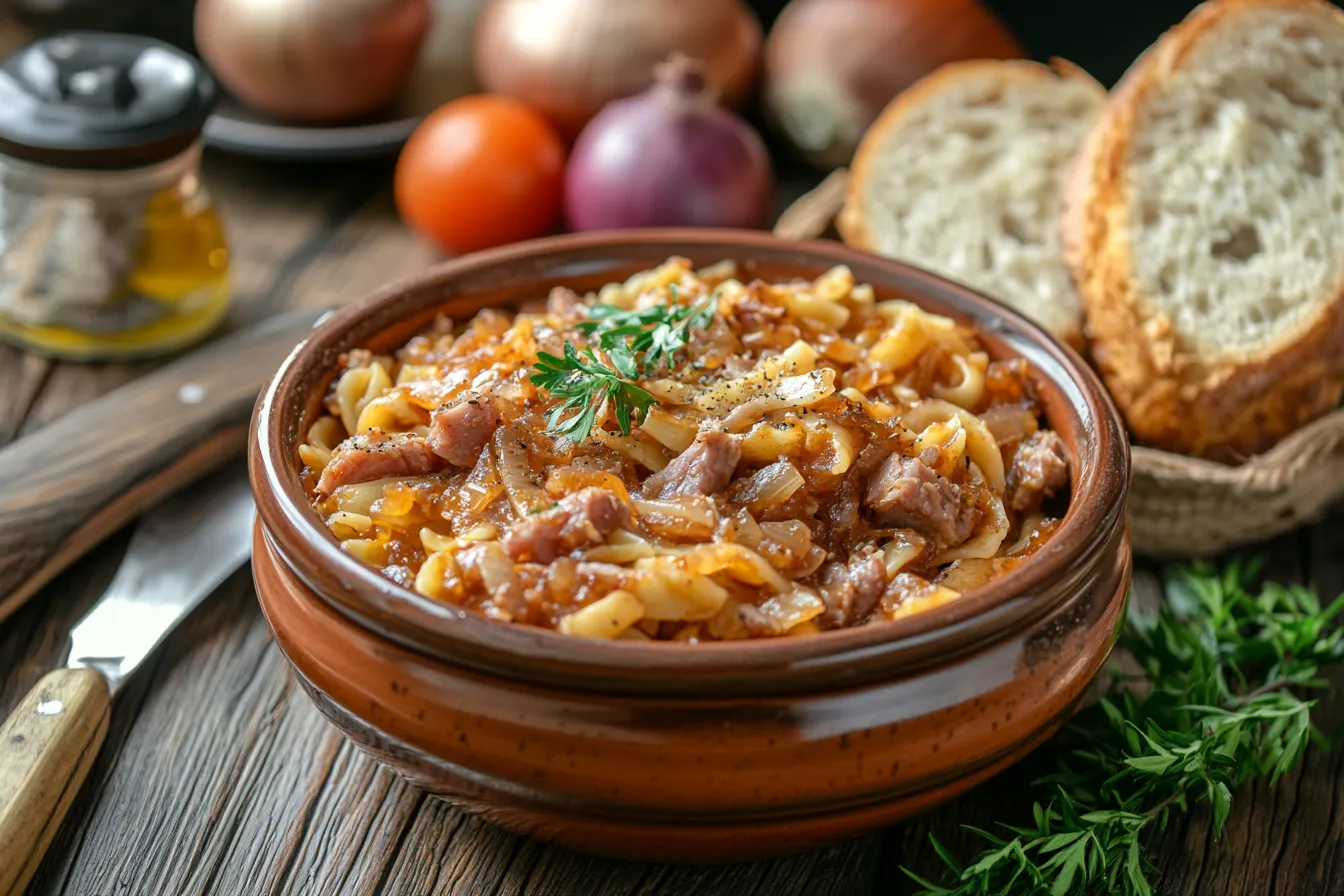
Name: Buona Beef Tuna Genovese Recipe
Ingredients
Equipment
Method
- Instructions:
- Heat olive oil in a heavy-bottomed pan. Add sliced onions and salt. Cook on low heat for 25–30 minutes until caramelized.
- Add garlic, red pepper flakes, and oregano. Stir for 1–2 minutes until aromatic.
- Pour in white wine to deglaze. Simmer for 5–7 minutes until reduced.
- Drain tuna and gently fold it into the onion mixture. Cook for 5 minutes to warm through.
- Simmer for another 10–15 minutes, adjusting consistency with pasta water if needed.
- Toss with cooked pasta or serve the sauce over pasta. Garnish with parsley, lemon zest, and cheese.
